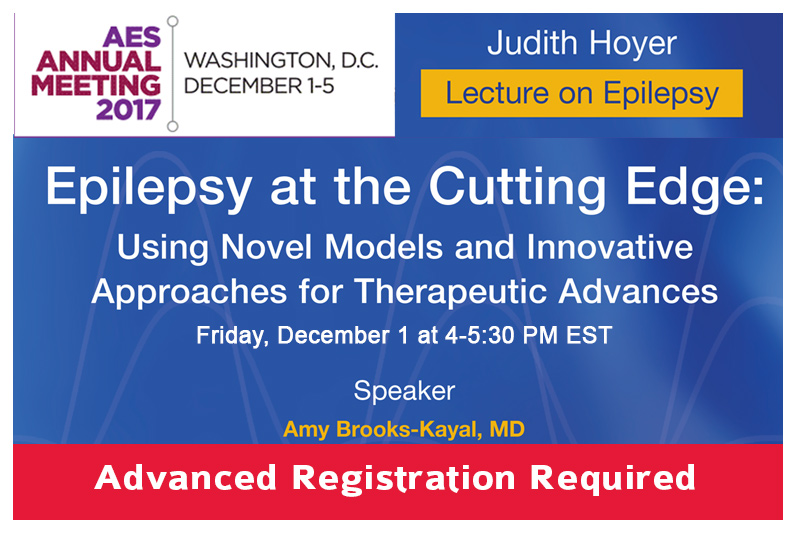
For NEAM 2017, get informed on the current state of epilepsy. Mark your calendar now for 12/1 for a webinar by leading epilepsy experts coming LIVE from the American Epilepsy Society meeting.
December marks the 71st meeting of the American Epilepsy Society (AES) an annual meeting of clinicians, doctors, nurses, and researchers who focus on epilepsy. The 2017 meeting takes place in Washington DC Dec. 1-5. It is full of the most up-to-date information about seizures, epilepsy, treatments, comorbidities and more. Many of Hope for HH Board Medical Advisory Board members will lead discussions and panels and present their research during the poster sessions. Hope for HH attends this meeting each year and does our best to translate findings into layman terms for our patients and caregivers. Stay tuned for summaries of key findings following the meetings.
For the first time, the Judith Hoyer Lecture will be available remotely via webcast. This is the lecture that kicks off the meeting and provides a great overview of the current state of epilepsy. The program will feature an update by Walter J. Koroshetz, M.D. from the National Institute of Neurological Disorders and Stroke (NINDS) and by Christianne N. Heck, M.D., M.M.M. from the Epilepsy Leadership Council (ELC) of which Hope for HH is an active member. The main talk will be given by Dr. Amy Brooks-Kayal on the topic “Epilepsy at the Cutting Edge: Using Novel Models and Innovative Approaches for Therapeutic Advances.” Dr. Brooks-Kayal is a clinician researcher at Childrens Hospital in Denver and a very dynamic speaker.
The program is slated for Friday, Dec. 1 from 4-5:30 PM EST. To join the program remotely, advance registration is required and is open now at: Register HERE
Talk highlights:
65 million people worldwide have epilepsy, and despite the existence of more than 40 anti-seizure medications, 1/3 of people with epilepsy have seizures that are not controlled with available therapies. All current medications for epilepsy symptomatically treat seizures only; none treat the underlying cause of epilepsy, specifically target mechanisms unique to certain epilepsy syndromes, or target “non-ictal” symptoms of epilepsy such as depression, anxiety, or cognitive and memory dysfunction.
All current medical therapies impact every cell all the time (not just during seizures) and result in unacceptable side-effects in many patients. None change the course of the disease, prevent/reduce progression or reduce the risk of epilepsy in patients at risk. In other words, we have no precision or disease-modifying therapies for epilepsy … yet.
Translational therapies on the horizon for people with epilepsy will do more than symptomatically treat seizures. Epilepsy researchers are using novel preclinical models and innovative approaches to develop new therapies that are precise, targeted and disease-modifying. They target cognitive and neurobehavioral co-morbidities as well as seizures. Most importantly, they have the potential to transform the lives of people with epilepsy.





